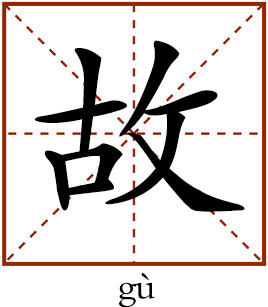Ancient

When used as an adjective, this character means “ancient, old or former.” When used as a noun, it refers to “reason, accident or ancestor.”
只有香如故
zhǐ yǒu xiāng rú gù
Zhi you means “only” and xiang refers to “fragrance.” Ru gu means “as usual.” This term means that only the fragrance remains the same.
This is a line from the ci poem, “The Diviner-Ode to the Plum,” by the Song poet Lu You. “Beside the broken post bridge there/ It blows, solitarily sane/ The dimming dusk it can hardly bear/ And there's the slash of wind and rain/ It contends for spring with no one/ That horde of flowers, let them flare/ It falls into dust, trundled to none/ Its aroma welling as ever” (trans. Zhao Yanchun).
In Chinese culture, the plum blossom has been loved and celebrated as a symbol of perseverance and nobility. This ci poem is known for its striking use of metaphor referring to the author himself. Lu has been most admired for the ardor of his patriotic poems, in which he protested the Jin invasion of the Song, and chided the Southern Song court for its passive attitude toward driving out the invaders and reconquering its lost northern territories. Because of his hawkish views, expressed at a time when the displaced court was controlled by a faction that was motivated by peace, Lu failed to advance in his career as an imperial official. Four times demoted for his outspoken opinions, Lu finally resigned his civil-service commission and retired to his country estate.
In this poem, Lu compares the plum blossom to himself. Its first half vividly depicts his depression and sorrow, as he struggles to survive in a harsh environment where nobody cares about or appreciates him. This alludes to how Lu’s proposal for beating the invaders and reconquering the lost territories was neglected by the court. The last half highlights his perseverance in the face of difficulty and his pursuit of his ideals—he had no desire to compete for fame and wealth and didn't concern himself with envious colleagues. The last two lines are believed to be the author’s attitude towards hardship and death—despite all of the sufferings endured, the plum blossom (Lu You) still lets its fragrance (moral integrity) subtly pervade the air at even the coldest times of the year.
edited by REN GUANHONG
